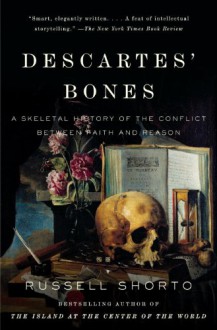Descartes' Bones Descartes' Bones Descartes' Bones
A New York Times Notable BookSixteen years after René Descartes' death in Stockholm in 1650, a pious French ambassador exhumed the remains of the controversial philosopher to transport them back to Paris. Thus began a 350-year saga that saw Descartes' bones traverse a continent, passing between...
show more
A New York Times Notable BookSixteen years after René Descartes' death in Stockholm in 1650, a pious French ambassador exhumed the remains of the controversial philosopher to transport them back to Paris. Thus began a 350-year saga that saw Descartes' bones traverse a continent, passing between kings, philosophers, poets, and painters. But as Russell Shorto shows in this deeply engaging book, Descartes' bones also played a role in some of the most momentous episodes in history, which are also part of the philosopher's metaphorical remains: the birth of science, the rise of democracy, and the earliest debates between reason and faith. Descartes' Bones is a flesh-and-blood story about the battle between religion and rationalism that rages to this day.From the Trade Paperback edition.
show less
Format: ebook
ISBN:
9780385528375 (038552837X)
Publish date: October 14th 2008
Publisher: Vintage Books USA
Pages no: 320
Edition language: English
Category:
Non Fiction,
Biography,
History,
Cultural,
Science,
Historical Fiction,
Medieval,
Religion,
Philosophy,
France,
Psychology,
World History

A very interesting romp through the intellectual history of Europe since the 17th century, with the remains of Descartes as the tour guide. The writing is good, but there is not much of a critical analysis as promised in the sub-title "a Skeletal History of the Conflict Between Faith and Reason". Hi...

Before reading this, I was only marginally familiar with Descartes and his contributions to philosophy and science. This book made catching up him and realizing his contributions to, and influence on, modern society very accessible and entertaining. The story of his bones traveling around was at tim...

The author uses the story of Descartes' bones as a metaphor for the divisive and rambling path toward human progress. The use of Descartes' bones in this way is doubly clever because not only is the physical path of the bones mysterious and controversial; Descartes' philosophy of questioning receive...






 14 years ago
14 years ago




 16 years ago
16 years ago